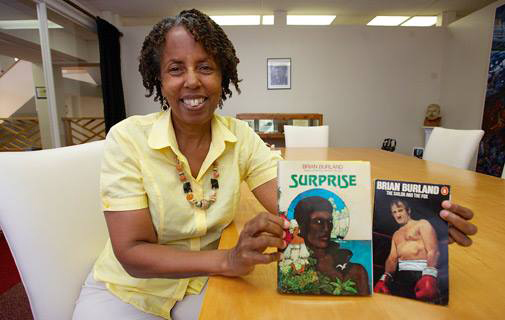Of the Salt
by Amelia PureHeart

Bermuda is a place of mystifying lore. It is the setting of many a vexed regard, many an enchanted story and fable or legend. Bermuda is a land where lyric is inspired and nurtured and located, but hardly regarded as the place that it is born.
To public befuddlement, Bermuda bears writers. Those who toil over laptop keys every night to fill the black text on newsprint every morning, those who poet in the underbelly (now central belly) of Chewstick’s griot hall, those who spring fable from letters to spawn fiction, and many many more, all of whom are seldom spoken of, heralded or acclaimed. It is a pity the literary charge of such a literary place is at a dismal. Ask any Bermudian on the street who their favorite local writer is and they probably will not be able to answer you. They may be able to call off Danielle Steele, or John Grisham, or whatever writer holds the NYT current spot of bestseller (Paula Hawkins). But how many of them will be able to name a Bermudian? A writer of the soil, or of the salt if you will.
Dr. Angela Barry is a writer of the salt. She’s a writer of the cedar, the skink, the limestone and the cahow. She’s ours. Professionally educated in the United Kingdom and Paris she most recently holds the title of resident writer and lecturer at the Bermuda College.
For her accolades she’s been published in BIM, The Massachusetts Review and The Caribbean Writer, along with a short story collection and a novel (if you’re not a writer that’s fine, just understand how difficult it is to get published in a literary journal and elsewhere. It’s damn hard.) She’s also a writer in a place that is apathetic about it’s literary incumbents (which is also damn hard.) This isn’t shots fired to the Bermudian public, it is a general observation about Bermuda’s tendency to overlook her literary purveyors in contrast to her athletic ones. Case in point: How many people can pinpoint and identify Charlie Marshall but can’t Brian Burland? The former being previous cricket great who played for St. George’s cricket club during his athletic tenure, the latter being a writer who published eight novels in his lifetime, a few of which were critically acclaimed and heralded by overseas writers, critics and the like.
Dr. Barry, for all her toils and tears set out to highlight the aforementioned Brian Burland. She spearheaded the need for a the now ‘Brian Burland Center for Research’ at the Bermuda College. A place where students and scholars and members of the public could research and learn more about a literary giant born and bred on this island where he was so unknown. She, in her quest, has also been teaching (via the Bermuda College) a course in Bermudian Literature. The course of which is in its final leg around its tenure at the Bermuda College.
Dr. Barry’s ‘Studies in Bermudian Literature’ is a welcomed beacon in a time where literary alignment can be difficult to find in our interestingly situated country (mid Atlantic, edge of Sargasso Sea, miles from land.) All of our culture is amalgamated from other cultures, we are a melting pot of everyone that ever set foot on our land. Foreshadowed as a land of devils, proclaimed as an untouched Eden, settled as an external appendage of the British Empire. Bermuda was highlighted by Shakespeare, darned in the seam of his swan song “The Tempest.” Grown out of coalescence our literary history sings like a virtuosic Cahow. One that has a song (or a howl) that isn’t heard, and when it is, isn’t easily identified.
In Dr. Barry’s Bermudian Lit class you journey through the literary timescape of our country. From the first mention of Bermuda in a literary faction, to studying our contemporary writers currently writing their wears in the tradition of Bermudian literary scholarship. It’s a glance into our culture that has weaved itself from many looms. You’ll learn about Brian Burland and his tireless writing ethic, his unheralded success and the fruits of his labour. You watch Bermuda take form in the uniqueness of words, phonetics and sounds found in its writers’ works. This class becomes not only a place to learn of the historical context of Bermuda’s writings, but one to challenge and question our literary fate. It is a place that firmly roots itself in the perpetuation of our future. We learn, to continue. Which ultimately is the effort of education, here in this class it is unmistakeable. Dr. Barry teaches passionately and carefully. She teaches in the tradition, on tradition, in hopes of inspiring a continuum of tradition.
In Spring 2016 Dr. Barry will teach Studies in Bermudian Literature for the final time. The class will finish with her final semester of teaching. It is with heavy regard that this class should end, at such a nascency in its term and with such peaceful fanfare with only few knowing of its brilliance. The beseech of this article of course, is to register for the class. For the opportunity to immerse headfirst into a part of our culture, that while so heavily influencing, still sits on the fringe of it. Like the histories of our national icons and leaders this class matters. If even to serve as a map, a literal representation of where we came from and where we are going.
We as Bermudians can summon national pride for so many things, all of which are deserving of our airhorns and shouts and spun rags and dances. This island in addition to athletes and elites of business, law and medicine, bears writers. It always has, I hope it always will. And if national pride looks like anything in Spring 2016, it’s sitting behind a desk in a classroom listening to a lecture by Angela Barry.
- Tags: Bermuda, bermuda college, bermudian writer, Bermudians, Kulcha
